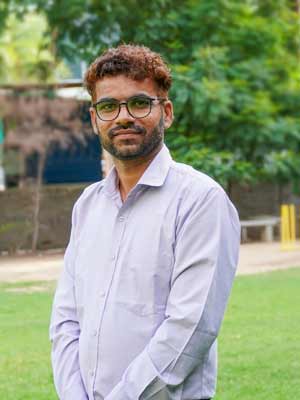
Mr. Shreeram Hudda
Designation: Assistant Professor
Shreeram Hudda’s research centers on developing secure, energy efficient, and scalable solutions for resource constrained IoT systems. His Ph.D. work introduced intelligent communication approaches, hybrid surveillance mechanisms, and lightweight security techniques that optimize energy consumption while maintaining robust data protection. He aims to advance IoT applications in healthcare, smart cities, and industrial automation by integrating ML/DL, computer vision, and edge/cloud technologies. Committed to impactful research and collaboration, he also values mentoring students. His teaching philosophy emphasizes inclusivity, active learning, and real world problem solving, supported by diverse assessments and digital tools to foster engagement and lifelong learning.
- Shreeram Hudda submitted his Ph.D. thesis to the CSIS Department, Birla Institute of Technology and Science (BITS) – Pilani, Pilani Campus, Jhunjhunu, Rajasthan, India.
- M.Tech. degree in 2016 from Lovely Professional University (LPU), Jalandhar.
- B.Tech. degree in 2012 from Rajasthan Technical University (RTU), Kota.
- In addition to academic research, he has also gained industry. As a Project Associate at the Society for Electronic Transactions and Security (SETS), Chennai (April 2019 – April 2020), he contributed to an NIC-funded project on Virtual Private Networks (VPNs), focusing on improving an IPsec-based indigenous mobile VPN application. Prior to this, he worked as a Junior Research Fellow (JRF) from August 2018 to March 2019 at ICAR – Indian Agricultural Research Institute (IARI), New Delhi, under a project funded by the Department of Biotechnology (DBT). During his Ph.D., he provided teaching assistance for several undergraduate and postgraduate courses such as Computer Networking, Parallel Computing, Network Programming, IoT Design and Development, Cloud Computing, and High-Performance Heterogeneous Parallel Computing.
- His research areas include Computer Networking related fields.
- Shreeram Hudda, K. Haribabu, “A Review on WSN Based Resource Constrained Smart IoT Systems”, Discover Internet of Things Journal, volume – 5, number – 56, Springer Nature, 2025, {Indexing: SCOPUS, Quartile 2 (Q2)}, https://doi.org/10.1007/s43926-025-00152-2.
- Shreeram Hudda, Rishabh Barnwal, Abhishek Khurana, and K Haribabu, “A WSN and vision based smart, energy efficient, scalable, and reliable parking surveillance system with optical verification at edge for resource constrained IoT devices”, Internet of Things, volume – 28, number – 101346, Elsevier, 2024, {Impact Factor: 6.0}, {Indexing: SCIE, Quartile 1 (Q1)}, https://doi.org/10.1016/j.iot.2024.101346.
- Shreeram Hudda, K. Haribabu, and Rishabh Barnwa, “Energy efficient data communication for WSN based resource constrained IoT devices” Internet of Things, volume – 27, number – 101329, Elsevier, 2024, {Impact Factor: 6.0}, {Indexing: SCIE, Quartile 1 (Q1)}, https://doi.org/10.1016/j.iot.2024.101329.
- Shreeram Hudda, “Uninterrupted VPN Connection-Service with Mobility Management and Dead Peer Detection”, Defence Science Journal, volume – 71, issue – 4, pages 507-514, 2021, {Indexing: SCIE, Quartile 4 (Q4)}, https://dx.doi.org/10.14429/dsj.71.15623.
- Shreeram Hudda, Ritika Mahajan, and Sarvesh Chopra, “Prioritization of user-stories in agile environment”, Indian Journal of Science and Technology, volume – 9, issue – 10.17485, 2016, {Indexing: SCIE, Quartile 2 (Q2)}, https://dx.doi.org/10.17485/ijst/2016/v9i45/105069.
- Shreeram Hudda, and Ritika Mahajan, “Spiral model for component-based software development”, Far East Journal of Electronics and Communications, special volume – 3, pages 817-836, 2016, {Indexing: SCIE, Quartile 2 (Q2)}, http://dx.doi.org/10.17654/ECSV3PII16817
- Shreeram Hudda, and K. Haribabu, “DySwitch: Dynamic Switching to Enable Secure and Energy Efficient Data Communication in Resource Constrained IoT Environment”, In the 39th International Conference on Advanced Information Networking and Applications (AINA-2025)}, pages 58-69, Springer, 2025, {Ranking: CORE B}, https://doi.org/10.1007/978-3-031-87769-8_6.
- Shreeram Hudda, K. Haribabu, Rishabh Barnwal, and Abhishek Khurana, “A WSN and Vision Based Energy Efficient and Smart Surveillance System Using Computer Vision and AI at Edge”, In the 38th International Conference on Advanced Information Networking and Applications (AINA-2024)}, pages 24-36, Springer, 2024, {Ranking: CORE B}, https://doi.org/10.1007/978-3-031-57870-0_3.
- Shreeram Hudda, K. Haribabu, and Rishabh Barnwal, “A novel approach for energy-efficient communication in a constrained IoT environment”, In the 38th International Conference on Information Networking (ICOIN-2024)}, pages 699-704, IEEE, 2024, {Ranking: CORE B}, https://doi.org/10.1109/ICOIN59985.2024.10572211.
- Shreeram Hudda, K. Haribabu, and Vikas Balani, “An energy efficient data transmission approach in smart IoT systems”, In the 38th International Conference on Information Networking (ICOIN-2024)}, pages 740-745, IEEE, 2024, {Ranking: CORE B}, https://doi.org/10.1109/ICOIN59985.2024.10572103.
- Shreeram Hudda, Aditya Dandwate, and K. Haribabu, “MMulCriApp: ML and MCDA Based Approach for Energy Efficient Communication for WSN Based Resource Constrained IoT Devices” In the 38th IEEE/IFIP Network Operations and Management Symposium (NOMS-2025), {Ranking: CORE B}.
- Shreeram Hudda, “Prioritization of User Stories in Agile Development Using Rank Ordering and Weighting Method”, In the 19th International Conference on Complex, Intelligent, and Software Intensive Systems (CISIS-2025), {Ranking: CORE B}.
- Shreeram Hudda, Rishabh Barnwal, Abhishek Khurana, and Tanupriya Chejara, “An MCDA and PERT Based Novel Approach for Prioritization of User Stories in Agile Environment”, In the 11th International Conference on Computational Science and Computational Intelligence (CSCI-2024).
- Shreeram Hudda, Tanupriya Chejara, and Abhishek Khurana, “Hamiltonian Circuit and Travelling Salesman Problem for DNA Sequencing in Fragment Assembly”, In the 5th International Conference on Frontiers in Computing and Systems (COMSYS-2024).
- Shreeram Hudda, Abhishek Khurana, and Tanupriya Chejara, “A Feature-Set Based Novel Approach for DNA Sequence Analysis”, In the 5th International Conference on Frontiers in Computing and Systems (COMSYS-2024).
